
Frequently Asked Questions
What is Rapid Transformational Therapy?
Rapid Transformational Therapy (RTT) is so much more than just Hypnotherapy. It is a hybrid therapy, that achieves outstanding lasting results quickly; combining the most beneficial principles of Hypnotherapy, Neuro-linguistic programming (NLP), Psychotherapy & Cognitive Behavioural Therapies. RTT has been developed by Marisa Peer who has fine-tuned this method over 30 years.
RTT achieves rapid and lasting results by rewiring the neural pathways of the brain, enabling your mind to give new, empowering messages to your body. This style of hypnotherapy allows you to quickly let go of unwanted behaviours or negative patterns and replace them with positive traits and habits.
The wonderful thing about RTT is that it is a therapy designed to enhance and effect changes in our neural circuits (neural pathways). RTT does this by working at a deep subconscious level, rather than a conscious level.
What is Hypnosis?
Hypnosis is entirely natural, safe and relaxing. It is a process for getting you into a relaxed state of mind where there is the ability for communication between your conscious (thinking) and subconscious (emotional) minds. It is a state of relaxed awareness where we can communicate with your mind to find the root cause of problems you are facing today.
Hypnosis is a natural state of mind that we all go into. Whenever our mind wanders, daydreams or is focused on something, such as reading a book, driving a familiar route, or watching a film we are in a state of hypnosis.
When used in therapy it is just like feeling very relaxed and talking to me with your eyes closed.
What is the subconscious mind?
The subconscious mind is below our awareness and is the part of our mind that notices and remembers information when we are not actively trying to do so. It influences our behaviour even though we may not realise it. It is often thought of as a hard-drive, a recorded database, storing everything about you.
I think of it like google. Everything we have ever seen, done or heard is stored in there. Using hypnosis, we can search the subconscious mind, just like a google search, to find the root cause and reason why you have the problems, issues or symptoms you have.
Your conscious mind may know, for example, that you should quit that unhealthy habit, eat less or exercise more often, but this conscious willpower can only guide you so far if the subconscious is holding onto a reason why you need the habit or excess weight. So it is the subconscious that needs an update or upgrade, just like we update our computers, phones and even our watches, because it is your subconscious beliefs that sabotage your conscious efforts.
How does the subconscious mind work?
Your brain and especially your subconscious mind has one job - to keep you safe! It helps keep you safe by helping you learn and adapt to life's experiences – especially negative ones. It literally stores every negative experience in that mind database to keep you 'safe'. But sometimes safe isn't what will make you grow, progress or enhance your life. Safe can hold you back, make you play small and keep you stuck in negative patterns of behaviour.
Each time you experience distress, trauma, or a highly emotive negative experience your brain imprints a negative belief so you can end up with many harmful beliefs stored in your subconscious mind, such as:
I'm not good enough
I'm not safe
I'm unlovable
I'm a bad person
I'm different
I can't connect
I'm alone and always will be
Then your mind uses these beliefs to create the filter that you perceive your life through. Every situation in your life is perceived through these damaging limiting beliefs.
For example if you were bitten by a dog as a child and your mind decided 'dogs aren't safe' then every time you see a dog your subconscious mind will alert you to let you know you aren't safe. The dog may be the safest dog ever but you are being controlled by the belief 'dogs aren't safe' and then you feel anxious.
Unless you recognise this and change any subconscious beliefs and thoughts, you’re destined to repeat the same negative patterns in your life because that is how the subconscious mind works.

What if I can’t be hypnotised?
This is a very common concern, one which I had myself. You can be hypnotised. Everyone can. It is an enjoyable relaxed process. If you are worried that you can’t be hypnotised it may be useful to tell yourself “I can be hypnotised, I want to be hypnotised, I am choosing to be hypnotised” over and over in the days before a session.
I also send each client a pre-session recording that shows them how easy it is to go in and out of hypnosis and prepares the subconscious mind for the full session. During the session, I use techniques to demonstrate to you and your mind that you are under hypnosis.
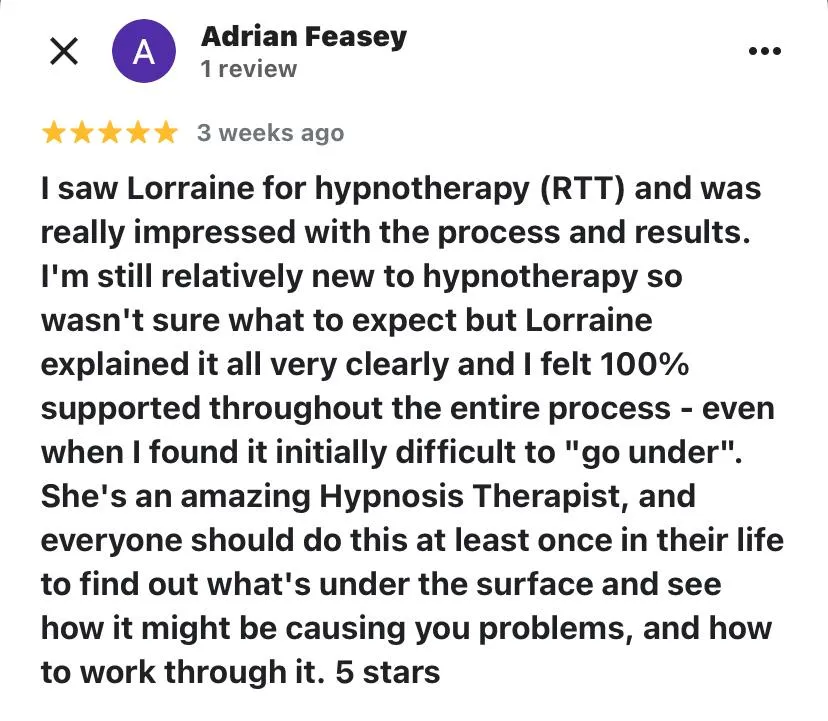
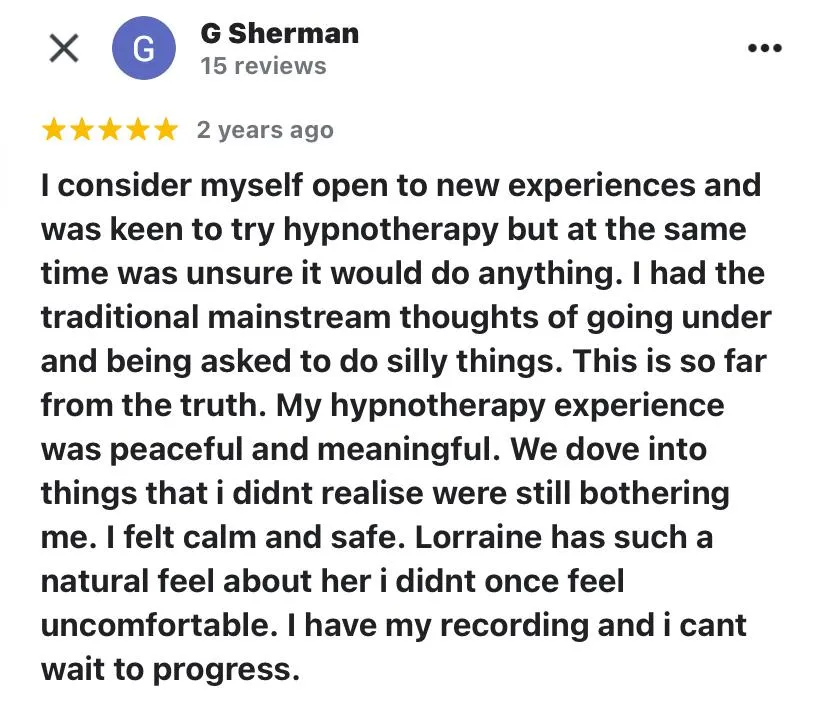
Am I under your power during hypnosis? Will you make me cluck like a chicken?
Absolutely not. You are in charge. I can’t make you cluck like a chicken unless you want me to. You will remain aware and in complete control the whole time. I cannot make you do or say anything you don’t want to. I cannot take you into hypnosis against your will. Also, if you don’t want to share something you won’t. It’s ok to keep the details to yourself as long as you tell me how what you are seeing or experiencing affected you.
Will I relive past traumatic events?
You will not relive past events however you will review them. As you review them you may have a strong emotional reaction (abreaction) but this is a powerful way to understand how the subconscious mind made decisions which now control your conscious thoughts and behaviours. You can come to an understanding of how to let go of negative feelings and beliefs connected to past trauma. As you review past events, you are in a safe place with me and I will help guide you to let go and build a healthier mindset.
“Abreaction” means an emotional release resulting from mentally reliving or bringing into consciousness, through the process of catharsis, a long-repressed, painful experience”(Mosby’s Medical Dictionary, 8th ed. 2009, Elsevier)
While an abreaction may be uncomfortable, my guidance will help you let go of the pain of how past events affect your life today. I believe that releasing the emotion that comes up in a session with me is extremely effective for letting go of the past and healing old wounds. Where the tears flow the healing goes. Tears are your body’s release valve for stress, sadness, grief, anxiety, and frustration.
Is everything confidential?
100%. All clients can be assured of complete confidentiality.
Should I have the session online or in person?
This is entirely up to you. It works just as well both ways. Online therapy is as successful as in person. It has been thoroughly researched & studies show it is just as effective as meeting face to face. I am committed to providing the highest level of service to my clients so I wouldn't recommend something I don't believe works. Most of my own sessions have been online.
Facial expressions, tone of voice & body language can be seen through video just like in person. I can still see & hear what I need in you to work effectively. The benefits to you choosing online is that you don't have to allocate additional time for travel, deal with traffic, take longer off work and can schedule the appointments around times that work for you.
Many people find they are much more comfortable in their own surroundings and open up faster as a result of feeling less vulnerable. Some research even found that online therapy may be more successful for some people however it is always down to your choice as it is not right for everyone.
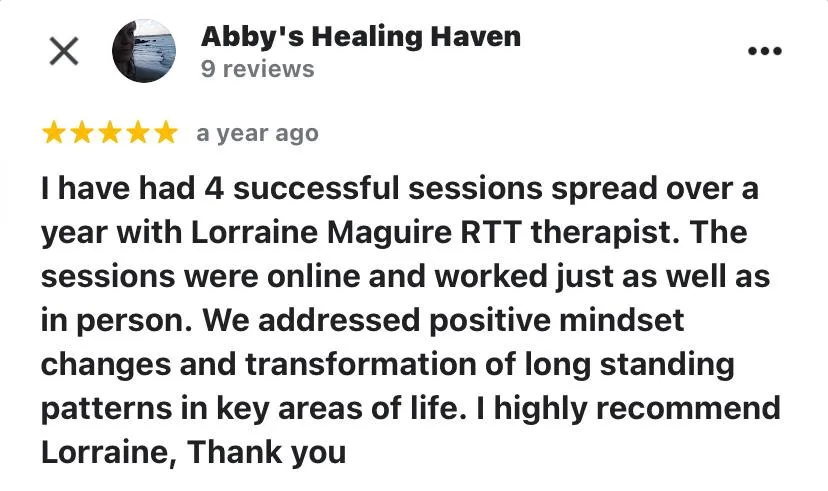
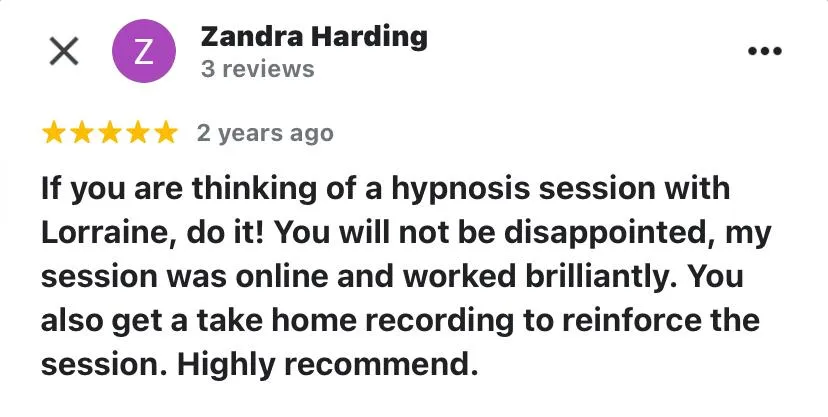
Will I fall asleep during hypnosis?
You are awake for the entire interactive session and aware of everything that is happening. I do not want you so deep in hypnosis that you cannot communicate with me. Success isn't dependent on depth of hypnosis. Hypnosis is actually about being suggestible and is a relaxed state where great changes can be made when you change the meaning and interpretation of past events and beliefs.
Some people do however fall asleep when I record their transformational recording and that is ok as you listen to that every day for at least 21 days and regularly thereafter.
When is the best time to listen to my transformational hypnotic recording?
You can listen to your hypnotic recording whenever is best for you however changing beliefs using a hypnotic recording is best done in the morning as you awaken or at night as you go to sleep.
This is due to the fact that the brain's frequency is in theta state and this is where experience blends imagination and reality. You may have experienced a theta moment when an alarm woke you up and in your half asleep state your mind mixed a dream with the alarm sounds. This is the mind blending imagination and reality. So if you are listening to your hypnotic recording upon awakening then your mind takes it as real and the changes occur more quickly.
You also pass through a theta brain state as you fall asleep. So every day you have two opportunities to reprogram subconscious beliefs in a natural state of hypnosis which amplifies the state of hypnosis the recording puts you into.
If you fall asleep to your recording that is ok as the recording will continuously download positive thoughts and images while you drift into the theta brain state and your mind absorbs the messages. I know this to be true as I have had many dreams in which someone is talking my recording to me in the dream and I have realised "oh I am in bed listening to my recording and dreaming about it at the same time".
I do suggest listening 1-2x per week sitting up if you fall asleep every time you listen.
Why should I listen to the hypnotic recording?
Because the mind learns by repetition. Practice makes permanent. The audio that follows the session will wire into the subconscious mind the changes taking place in the neural circuits.
There are three things contributing to success: your belief that you can change and this will work, the sessions which start the changes, and the recording/s will really help to reinforce the change. Playing the recording will help the changes last for good and change the neural pathways in the brain.
How long should I listen for?
Listen for at least 21 days or until we have our catch up after the session.
In our catch up we will discuss progress and how long to continue listening for.
I say - don't give up before the miracle happens!
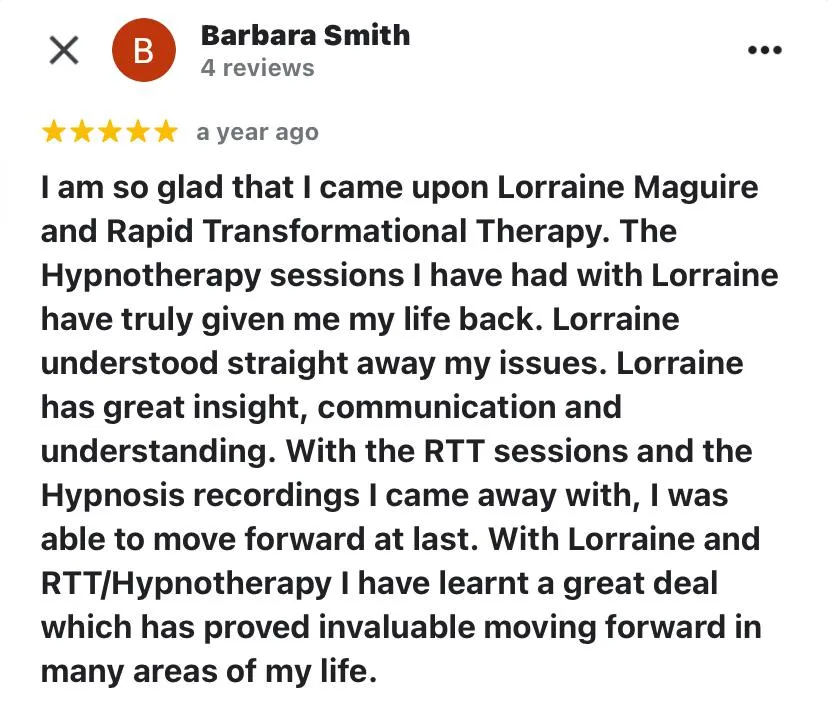
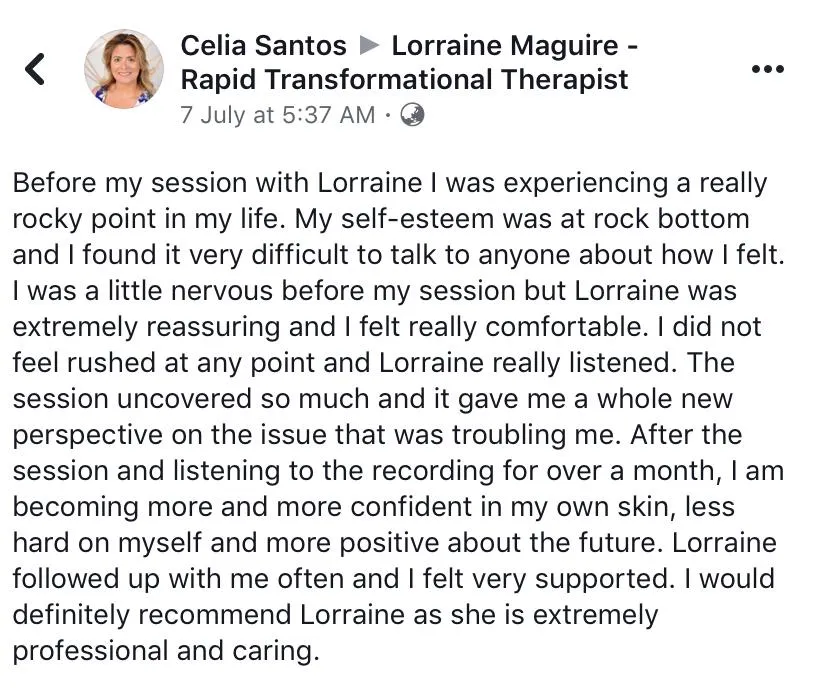
How long does it take to form new habits?
Research shows that it can take anywhere between 10 and 254 days to form new habits however on average it takes around 66 days. That is another reason why it is important to continue listening consistently to the hypnotic recording and taking any recommended actions.
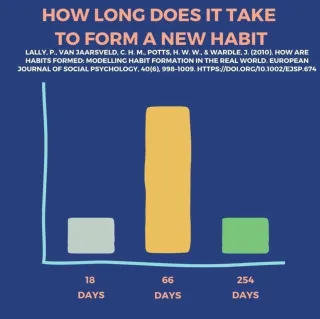
How does change happen?
Awareness: First you have to become aware of the problem - this can be painful as you sit in the old way of being. You are aware but you are still there. You are aware that you are not happy or comfortable or where you want to be but don’t know as yet a new way to be.
Acceptance: You need to accept that you have these issues and they are causing you pain. You are no longer trying to force them away or deny them or keep doing what you have always done. You are ready to face them.
Commitment: You need to make a clear decision that you want to change. You need to be willing and open to change and transform your life. Willingness is the key!
Action: Now you take action to change as you are willing to do anything to change. You get therapy. You listen to your hypnotic recording. You say affirmations. You find new ways of being. You change your thoughts when you see the old ones. You implement new habits. You ask for help instead of doing it yourself. You let someone in to see the real you. You share how you feel honestly with someone. You let down your guard and trust.
Transformation: This can be challenging as you fluctuate between the new and the old - one day you feel absolutely fabulous in the new and the next day you slip back into the old. You keep going with action and eventually you transform as the new becomes your familiar and the old slips away. This is the struggle of the butterfly coming out of the cocoon - if you stop taking action you stay in the cocoon - if you keep taking action even if it feels unfamiliar, strange or uncomfortable then you will emerge as the butterfly.
Is the change instant with hypnosis?
Hypnosis is an extremely powerful way to facilitate change in people’s lives and I have used it to help hundreds of people change over the last 8 years. Hypnosis is not magic however and I can’t make anyone do what they don’t want to do. It is an amazing tool to help clients let go of the past and move toward their goals but they also must do their part.
While all hypnotherapists love it when their clients get instant, almost miraculous change, the reality is that most of the time for most people it is a process of using hypnosis session by session to remove layers of past beliefs and installing new habits and behaviours to create the desired outcomes.
Some people have instant change, others have cumulative changes, little by little, and others have retroactive change where it feels like nothing changes and then boom something shifts the longer they listen to the hypnotic recording/s I make for them.
Do some people not change?
There are many reasons why people don’t change, even with the power of hypnosis, and I want to share some of these with you as it may help shift your mindset and help you make the changes you desire. Sometimes when we see why we aren’t changing we can let that go. Understanding is power!
1) You don’t truly desire the change, you want to keep the habit, belief or behaviour.
2) You are resisting change that feels imposed from the outside. It is not your choice to change. Someone else is wanting you to change.
3) You are afraid of letting go or losing control and so your conscious mind stands in the way during hypnosis (note: with hypnosis you are never under my control and you are in control the whole time).
4) You want the changes to be done for you (or to you) and you are not willing to put in any effort.
5) Your subconscious feels it is not safe to change and is trying to hold on to the old ways as they are there for comfort, safety or protection.
6) You consciously believe the lies your subconscious mind is telling you, for example, I'm not good enough, I'm a bad/terrible person, food is comfort, smoking is relaxing, excess weight keeps me safe and so on.
7) You fear change because change is scary and unsafe. Change is bad. Change hurts. Change is dangerous.
8) You fear criticism or judgment of the changes you are wanting to make. You put others’ opinions and views above your own. You fear what people will think if you change.
9) Your environment is holding you back – there is something or someone in your environment that makes it unsafe to change. People around you want you to stay as you are.
10) You’ve tried to change in the past, failed, and have given up as you don’t believe you can change.
11) You don’t believe you are worthy of change, happiness or success due to past or current behaviour or actions or what has been done to you.
12) Change may threaten your self-image and how you think people perceive you.
13) Change requires you to give up someone or something you are not yet willing to let go of.
14) You don’t feel enough pain yet – the pain of staying the same must be greater than the pain of change.
Certified Clinical Hypnotherapist
Certified Advanced Rapid Transformational Therapist
Member – International Institute for Complementary Therapists
